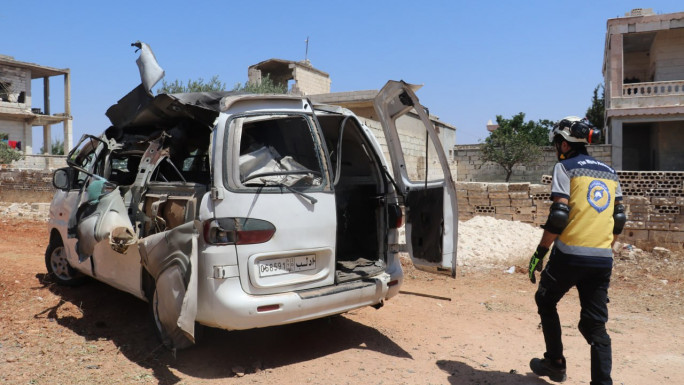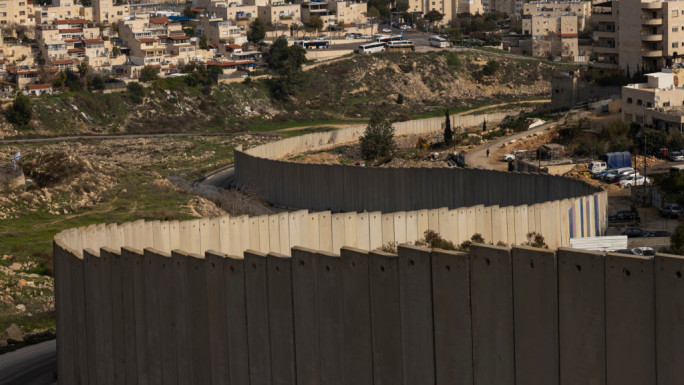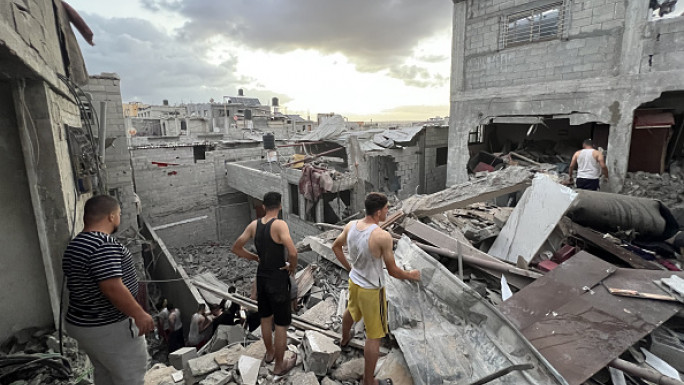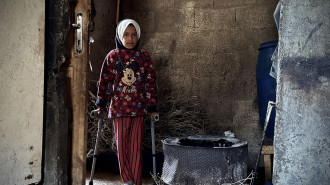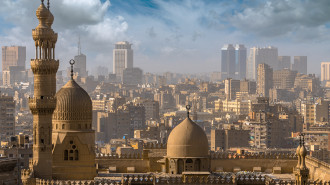
'Two children die every day due to hunger': Darfur IDPs on the brink of starvation as aid dries up

“Hunger is our biggest crisis,” says Hafiza Musa, a 33-year-old displaced woman who has lived in the Al-Hasahisa camp in Zalingei, the capital of Central Darfur state, since 2007.
Musa’s voice trembles with emotion as she recounts how most of the nearly 50,000 displaced people (IDPs) who lived there relied on aid from organisations and some small-scale farming.
According to a UN report, the camp eventually emptied by early November as people managed to flee the relentless bombing, leaving behind damaged brick homes and ghost-like streets.
“Since the war began, everything has fallen apart,” Musa told The New Arab, describing the devastating impact of the ongoing conflict.
“When the fighting reached the camp in October, 100 people were killed and over 200 were wounded. But worst of all, children and the elderly died of starvation because the aid organisations disappeared.”
The armed conflict in Sudan, which broke out on April 15, 2023, between the army forces and the Rapid Support Forces (RSF), has left Darfur’s displaced populations teetering on the brink of starvation.
With the army controlling Port Sudan and blocking aid delivery to Darfur, and militias seizing the aid in areas controlled by the Rapid Support Forces, the residents are left to face an inevitable fate.
Despite efforts by the World Food Program (WFP), which has delivered humanitarian aid to about half a million people in Darfur this year via convoys coming from Chad, the ever-increasing number of displaced persons complicates the mission, according to a WFP report.
Furthermore, road conditions are quickly deteriorating, particularly in remote parts of Darfur and Kordofan, becoming waterlogged and muddy due to seasonal heavy rains.
This is slowing the delivery and distribution of humanitarian assistance to some areas.
Weaponising hunger
The situation in Darfur is catastrophic.
"Ninety percent of the people cannot afford a single meal a day,” says Adam Rajal, spokesperson for the Coordination of Displacement and Refugee Camps in Darfur.
“The declaration of famine was long overdue. The response to our appeals has been weak, and thousands are at risk of death if aid doesn’t arrive soon.”
Approximately 2.6 million displaced persons live in Darfur's 56 camps, spread across five states: 21 in West Darfur, 17 in Central Darfur, 11 in South Darfur, six in North Darfur, and one in East Darfur.
Since the war's onset, these camps have seen a surge in numbers as city residents flee to escape the violence. This influx has worsened the already dire food scarcity, as both warring factions obstruct the flow of humanitarian aid.
The Rapid Support Forces control four out of Darfur's five states, making aid delivery increasingly challenging.
In its June 27 situation report, the WHO announced that in Sudan, over 750,000 people are experiencing catastrophic levels of food insecurity with 25.6 million people in crisis levels of hunger, noting that the hunger catastrophe is on a scale not seen since the Darfur crisis in the early 2000s.
Thwarted aid efforts
In a confirmation of the worsening conditions, in early July the WFP reported that unidentified gunmen attacked and looted three trucks loaded with food aid en route to Central Darfur.
“The safe delivery of supplies must be guaranteed by all,” the organisation urged on its official social media, noting that the aid will no longer go to the most vulnerable people in need.
“More than 50 children have died from malnutrition and lack of medicine from February to June this year,” the general coordinator of Darfur’s displaced and refugee camps, Yaqoub Fari, told The New Arab.
Fari lives in South Darfur’s largest camp Kalma which has seen an influx of about 100,000 displaced persons since the war began.
“The food aid that arrived in June did not cover the needs of the displaced. It was very limited compared to the size of the displaced population, with each family receiving only corn cobs,” said Fari.
Echoing the dire need for support, Abdelazim Hassan from the Neim camp in East Darfur describes the severe shortages.
“The cessation of humanitarian aid has left us without enough food and medicine,” he told The New Arab.
According to statistics from the Sudanese Humanitarian Aid Commission, said Fari, the number of displaced families in Neim is 83,846, not including those who arrived after the escalations in Al Fasher, the capital of North Darfur.
The grim reality
Anwar Yusuf Adam, an elder displaced in Zamzam camp in North Darfur, paints a grim picture.
“The conditions are terrible. We struggle to get water, and food is scarce. The fighting has brought over 20,000 new people to our camp. Eight of 22 water wells are out of service,” he says.
“Two children die every day due to hunger.”
Musa echoes his words.
“The failure of the de facto authorities to take responsibility for providing food, water, and medical care has cost the lives of countless children and the elderly,” says Musa, reflecting the prevailing sentiment of IDPs who are demanding urgent international intervention to put an end to the humanitarian tragedy.
Mothers like Musa are left to watch helplessly as their children waste away.
In the crowded conditions of Kalma camp, Yaqoub Fari speaks of the heartbreaking scenes he witnesses daily.
“The situation is unbearable,” says Fari, as he recounts the rising death toll among the camp’s youngest and most vulnerable residents.
“We have people collapsing from hunger. It’s a daily occurrence,” added Hassan from Niem camp.
“The lack of medicine means even treatable illnesses become deadly. We need help, and we need it now.”
Calls for action
Humanitarian organisations are sounding the alarm, but the response from the international community has been sluggish, says Sudan Liberation Army spokesperson, Mohamed Abdul Rahman Al-Nayer.
Al-Nayer is unequivocal in his appeal.
“The world cannot stand by as Darfur starves,” he says. “We need immediate intervention to prevent a catastrophe.”
The scale of the crisis in Darfur is staggering, but despite the immense hardships, the displaced communities are striving to survive.
Grassroots efforts within the camps, like the meal preparation by the youth in Zamzam camp, are making a difference, albeit a small one.
“We do what we can, but it’s not enough,” says Adam. “We need the world to see us, to hear our cries for help.”
Eisa Dafalla is a Sudanese journalist focusing on Darfur's coverage
This article is published in collaboration with Egab

